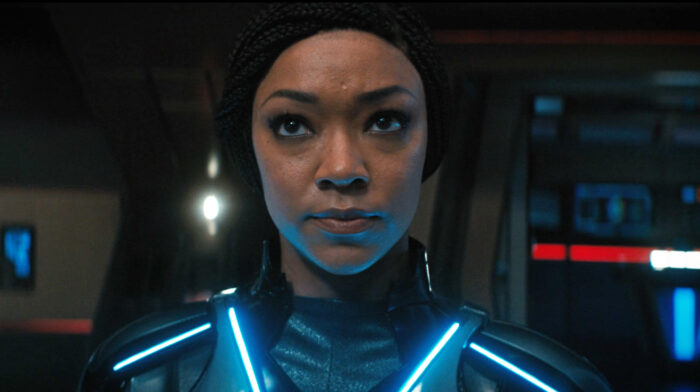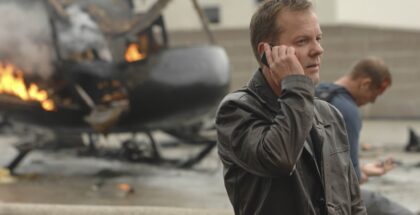UK TV review: Star Trek: Discovery: Season 4, Episode 6
Review Overview
Boring black sub-space rift
5Gray’s counselling session
5Zora sings
4Ian Winterton | On 01, Jan 2022
Warning: This review contains spoilers.
Another less than scintillating episode from Star Trek: Discovery leads one to wonder if Season 4 is running out of steam. It certainly doesn’t help that the season’s Big Bad – the planet-eating Dark Matter Anomaly – feels like a tired-old sci-fi trope, especially when, as in this episode, it’s an adversary discussed in abstracted pseudoscience.
“Our mission today,” Michael (Sonequa Martin-Green) tells the crew – sounding more like an NPC in a video game cut-scene than ever, “is to go to that most recent tear and find any clues the DMA left behind. Molecular compounds, thermal radiation, residual ions, industrial remnants…” In short, Episode 6’s mission is to pop into a subspace rift where the Big Bad is revealed to be… a dark void of nothingness. It’s a tricky thing for the cast to act against and, although they do their best, it’s hard for the audience to truly care. For a lot of the episode’s runtime, the nearest we get to an interesting visual is one of Discovery’s drones disintegrating; other than that, it’s just people standing around on the Bridge, frowning.
The B-story is similarly dull, involving as it does Zora (voiced by Annabelle Wallis), the ship’s newly emotional and sentient integrated AI. So, when the crew aren’t reacting to a black void of nothingness, they’re engaged in conversations with a screen and a disembodied voice. Add to this an utterly dreary subplot in which Gray (Ian Alexander) counsels Zora like she’s some lovelorn teen on summer camp, and you have what is perhaps the wettest episode of Trek ever. Starfleet isn’t quite a military organisation, but the fact no one seems overly alarmed that the ship’s computer is confessing to being overwhelmed and scared does push credibility somewhat. Especially after the run-in with Control in Season 2, surely someone should just pull the plug before Zora goes full-on Skynet?
Entering a rift of their own are Michael and Book (David Ajala), his desire for revenge for the destruction of his homeworld continuing to clash with Michael’s more by-the-book approach. After Book is bombarded with energy from the rift as he tries to spin Discovery away via spore drive, he’s visited by the ghost of his father (Rothaford Gray) who further reinforces his guilt: “Our planet’s gone and you’re sitting on someone else’s ship, letting yourself be ordered around. Communing with mushrooms? What a waste of your gifts… There’s an enemy out there, son. You should be hunting it.”
Because the writing is strongest in this section, and Ajala’s considerable acting chops are matched by Gray, this is by far the most effective sequence this episode. But that’s not saying much when, after a plodding 40 minutes, we’re taken to a truly awful climax.
To enable Discovery to break free of the rift, a plan is devised once again by Commander Bryce – Ronnie Rowe – drawing on 20th Century science, this time echo location. That plan, unfortunately, means the starship will shed its shields and likely go boom. To maximise its power output, all life support is turned off and the entire crew are beamed into the ship’s “pattern buffer” – a holding cell for their molecules as previously used as a plot device in both Deep Space Nine and, in The Next Generation, as a neat reason why Scotty was still alive to meet Picard et al. Presumably this incredibly far-fetched tech uses less energy than simply keeping carbon dioxide scrubbers operating and recycled air running through the ship…
But it’s not this trick that makes this one of the worst Discovery episode but the fact the episode ends with Zora – the AI – singing a song: Stormy Weather (the episode’s title). It’s hard to recall a more cringe-inducing sequence in all of Trek (possibly the Gilbert & Sullivan holodeck scene in the First Contact movie) and the fact it tops off an episode this dull makes it all the worse.
Plot-wise, we discover that the DMA originates outside of our galaxy, which, in narrative terms, is another shrug. But it will at least, hopefully, mean our heroes are one step closer to solving the mystery – fingers crossed that whatever comes next is less boring.





















